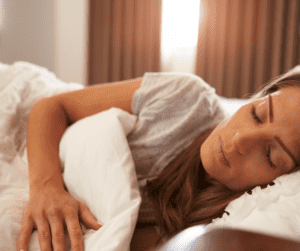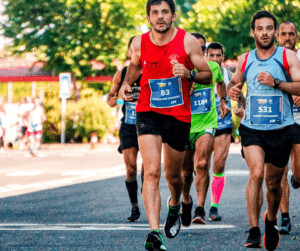As you start to set new performance goals for yourself to stay motivated, you begin to ask yourself how much further and how much faster will you be able to run…
One of the most important and easiest ways to increase your speed and endurance is to sleep more.
We all know how vital sleep is even though many hyper-busy people discourage it… We’ve all got that friend who brags that they only need 5 hours of sleep a night… Or the celebrity who says they wake up at 4 am every day (even though they went to bed at 10 pm.. Because let’s be honest who can fit everything into that kind of day… )
We’re here to tell you that as a runner (yes, you are a runner). Getting enough sleep is as important as your nutrition and training sessions. And yes dropping the ball on one of these will cause the whole tripod to collapse.
Being in a sleep debt will negatively affect your running performance and getting extra sleep will improve your running performance.

An increasing amount of research suggests that runners need more slow-wave sleep if they want to increase their speed. This is because slow-wave sleep is the most restorative stage of your sleep.
Let’s have a more detailed look at how getting more sleep will positively affect your running performance…
Positive Effects Of Sleep On Running Performance
- Water Reabsorption
- Muscle & Tissue Repairs
- Human Growth Hormone
- Weight Loss
- Hormonal Balance
- Concentration
- Reduce Injury Risk
- Immunity Boost
Water Reabsorption
We know that drinking water is essential. H2O accounts for up to 60% of the human body, and it helps with a wide variety of bodily functions, like cell growth, waste removal, and digestion.
One of the ways getting a good night’s sleep can benefit your running is water reabsorption.
When you sleep, your kidney balances water, sodium, and other electrolytes. Without enough water, the kidneys can’t balance your electrolytes properly, which could lead to dehydration.
Pro tip: You can tell if you are well hydrated if after a good night’s sleep you urinate within an hour of getting up.
Muscle & Tissue Repairs
A lot of runners don’t know this but you aren’t getting better at running while you’re running… Sounds weird right… The truth is, your body’s adaptation only happens in your recovery.
And… a major part of your recovery is SLEEP.
When you hit the hay your body repairs and regenerates damaged tissue, it builds bone and muscle to be ready for your next training session.
In one study published by Standford, they had basketball players maintain their regular sleep schedule of six to nine hours for up to four weeks.
After that, they were asked to sleep 10 hours each night for five to seven weeks. Running speed improved significantly by 16.2 seconds versus 15.5 seconds for 282-foot sprints!
When you sleep deeply Human Growth Hormone is released. HGH aids in repairing tissue, building muscle, strengthening bones, and converting fat to fuel.
The time you go to sleep also influences this as it happens quite early in your deep sleep.
The point is, if you’re not following a bedtime routine this throws your endocrine system off.
When you run, you aren’t just building your stamina and strength; you’re also breaking your body down, causing a tiny amount of tissue damage with every step.
So, allowing yourself time to recover after your runs is what makes it possible for you to come back better adapted for your next run.
Human Growth Hormone
When you sleep deeply when you’re in slow-wave sleep, your body releases Human Growth Hormone (HGH).
It is produced in your pituitary gland and released into the bloodstream to repair your damaged tissue and to build stronger muscles… that adaptation we mentioned above.
If you don’t get enough sleep and quality sleep that means less HGH is released, therefore you won’t be able to recover fully from your training and you won’t adapt, as a result, your running won’t improve as you would like.
HGH rebuilds damaged tissue while building stronger muscles. It also helps convert fat to fuel and keeps our bones strong.
Side note: Taking exogenous testosterone and growth hormone is illegal. – You get banned for years or life if caught. (So it clearly is an important hormone)
Why would you not want to maximize the natural release of these… In a legal and natural way… by getting more quality sleep.
Weight Loss
Getting more slow-wave sleep can contribute to weight loss.
If you don’t get enough sleep, your body’s appetite-signaling hormones called leptin and ghrelin don’t work correctly.
Less sleep = Increase in ghrelin = Feeling hungry
Less sleep = Decrease in leptin = Not feeling full
Cortisol release also plays a role here. If not sleeping, your body is in a state of stress and so increased cortisol levels will mean a decrease in your ability to lose weight.

Hormonal Balance
By not getting enough sleep, your body produces less Human Growth Hormone and produces more Cortisol. Both of these effects make it very hard for your body to recover properly.
We chatted about it above but in a bit more detail…
Ghrelin hormone: Known as the “hunger hormone” because of its stimulatory effects on food intake, fat deposition, and growth hormone release.
Leptin hormone: Regulates energy balance, suppressing food intake and thereby inducing weight loss.
When we don’t get enough sleep, we have an increase in Ghrelin and a decrease in Leptin. This results in us eating more, even if we don’t need to because we don’t have a signal to stop.
Concentration
Getting the right amount of sleep affects your concentration. Concentration can be negatively affected when a runner trains without enough sleep.
You need to get enough slow-wave sleep to tune into your body better, improve your concentration, and improve your strategizing ability. (This is particularly important for trail runners to keep alert on the trails to avoid falling and injury)
When people don’t get enough sleep, their attention and concentration abilities decline. Their reaction time lengthens, they’re inattentive, and they don’t respond as well to environmental signals.
Reduce Injury Risk
There is no greater fear than a potential running injury during marathon season.
When you’re training for a specific event, (particularly in the 6-8 weeks of peak training) try and prioritize sleep and try to get 30 to 60 minutes more than you would normally get.
That little extra sleep will make a big difference to your recovery and avoid any running injuries.
Numerous studies have shown across all sports that less than 7 hours of sleep increases the risk of injury and illness.
This study explains how a lack of sleep can lead to the common cold.
Immunity Boost
No one want’s to be a week away from race day with the flu… Getting sufficient hours of high-quality sleep enables a well-balanced immune defense that features strong innate and adaptive immunity.
In this study, researchers from Germany found that getting a good quality sleep improves immune cells known as T cells.
T cells fight against intracellular pathogens such as flu.
Let’s find out if there is a magic number when it comes to how many hours of sleep runners require to improve their running performance.

Why Slow-Wave Sleep Is Important For Runners
During the slow-wave stage of sleep also called deep sleep, memories are consolidated, learning is enhanced, and the brain is cleansed of toxins.
New research shows that even small decreases in slow-wave sleep are linked to declines in athletic performance.
This is because decreases in Slow wave sleep are linked to a decrease in HGH, which means the body is unable to repair the damage sustained during training therefore the body is not able to adapt, and running performance won’t improve.
This is how to improve your slow-wave sleep…
How To Improve Your Sleep To Run Faster
- Be as consistent as you can be with your sleep patterns.
- Do it naturally. (Nutritious diet & good sleep hygiene)
- Avoid alcohol, caffeine, and nicotine.
- Minimize stress as much as possible.
- Put the phone down and the Tv off. (Too much screen time can disrupt sleep and affect melatonin levels)
- Power nap.
- Avoid exercise within 3 hours of bedtime.
- One hour before bed, wind down with something calm and relaxing like reading a book.
- Keep your bedroom cool and dark.
- Ensure there are no flickering lights, there should be no cellphone beeping lights or TV lights.



Comments are closed.